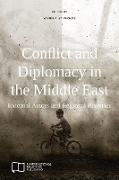- Start
- Conflict and Diplomacy in the Middle East
Conflict and Diplomacy in the Middle East
Angebote / Angebote:
The Middle East's geographical and strategic uniqueness has made every great power in history to seek to advance its interests in the region. Yet, the region constitutes the greatest single reserve of oil in the world, which has made it a regular source of foreign powers interference in the post-World War II era. In addition to its geographical and strategic uniqueness, the Middle East is the birthplace and spiritual center of the three most important monotheistic religions, namely Christianity, Judaism and Islam. Due to its geopolitical importance, any inter- and intra-state conflict in the Middle East has the potential not only for destabilizing the region as a whole or upsetting the regional balance of power but also affecting global stability. For these reasons, the Middle East has been a major center of world affairs, an economically, politically, and culturally sensitive area.This volume provides an account of international relations in the contemporary Middle East. After employing the Regional Security Complex Theory (RSCT) in order to define and delimit the region of the Middle East, individual chapters are dedicated to addressing the question of regional order, examining how regionalism and globalism feature in Middle Eastern integration processes, exploring regional bids for hegemony, and investigating the approaches and policies of major international actors, such as the United States, Russia, China, the European Union and the United Nations.ContributorsJonathan Cristol, Xi Chen, Ali G. Dizboni, Onur Erpul, Stefanie Georgakis Abbott, Spyridon N. Litsas, Allison Miller, Sofwat Omar and Ays¿egu¿l Sever.
Folgt in ca. 10 Arbeitstagen
